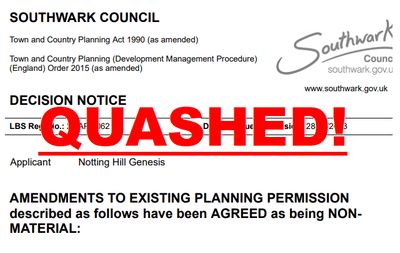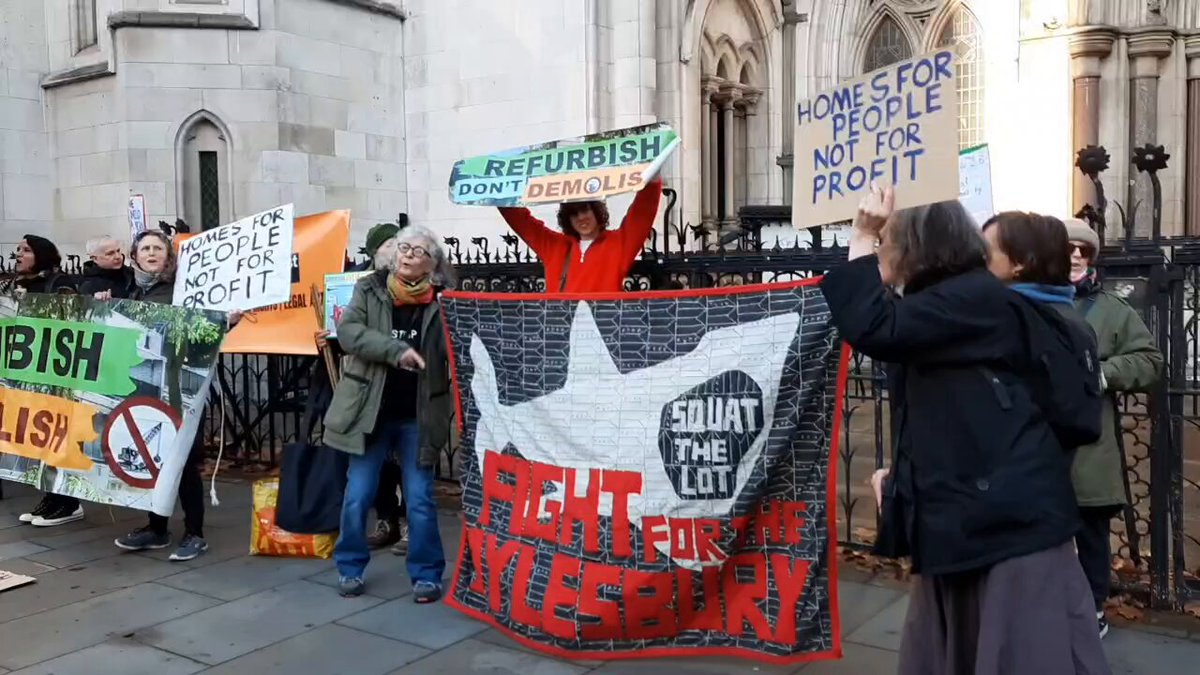
Amendment to outline planning permission quashed
The legal challenge against the decision to amend the outline planning decision for the regeneration of the Aylesbury estate has succeeded. The High Court quashed Southwark's decision in its judgement on the 17 January, after a hearing last November.
The challenge was brought by long-term Aylesbury resident and campaigner Aysen Dennis. Aysen argued that a change to the description of the redevelopment was unlawful. The change was made to smooth the path for a planning application by Notting Hill Genesis (NHG) for Phase 2B. NHG holds an outline permission for the whole of the estate, including Phase 2B, which was awarded to them in 2015. But in 2022 NHG applied for a new 'drop-in' application just for Phase 2B, because they wished to build something taller than the outline permission would allow. In tandem with this, Southwark decided to change the wording on the outline permission to remove any potential legal obstacles to the new application.
The change itself was to add the single word 'severable' into the outline permission for Aylesbury development. This would make it easier for NHG to treat the different phases and parts of the development separately, rather than as a whole. Aysen argued that the outline permission was granted for an integrated scheme, with interconnected and interdependent parts and not for something where NHG could 'mix and match' what was built, using different planning permissions. Aysen submitted that while the outline permission was flexible, it also set the physical limits and parameters across the whole site, needed for a coherent scheme and was therefore not severable.
Southwark and NHG's case
According to the judgement, Southwark had argued that the outline permission was just that - 'very outline'. It was not a detailed permission and allowed for a flexible development that would take a long time to complete. On a legal point, Southwark said that what was built on one phase would be less likely to create a problem with what was built in later phases, because each was on a "'discrete area' [with].....no necessary overlap or conflict". The outline permission gave Southwark and NHG 'scope.....to react to whatever has already been developed in earlier phases when considering a subsequent phase'. Southwark further argued that adding the word severable to the outline permission was not the main point, and that 'the key issue was whether an outline permission authorises a number of independent acts of development on spatially discrete areas of land through a phasing arrangement...'.
NHG took part in the case as an interested party. They addressed the same legal point as Southwark, saying that it was inappropriate to apply the reasoning of a recent Supreme Court decision on similar issues (Hillside) to this case. In relation to this, NHG emphasised the distinction between an outline permission and a detailed decision. and that 'there is an obvious and inherent form of severability contemplated' in an outline permission for a phased development.

The judgement
The judge, the Hon. Mr Justice Holgate, did not agree with Southwark and NHG. He said that the key question was what the outline permission actually meant (what he called the scope of its 'bundle of rights') and how that meaning had been changed by adding of the word 'severable' to the permission. He ruled that this was a significant 'material' change and should not have been made in the way that it was. He therefore ordered that the decision to amend the outline planning decision, by adding the word 'severable', be quashed.
In reaching his decision the judge said*, 'with respect'*, that Southwark and NHG's points about phasing and severability 'lacked coherence'. He showed particular concern in his reasoning about how a severed planning permission might fall foul of time limits for implementation, if it were broken into parts.
He also notes that there would have been be nothing to stop NHG from breaking a permission down further than just into phases, if the word 'severable' was added to the permission, saying that 'I have strong reservations in any event about the legality of an amendment to a planning permission which simply inserts language as uncertain as the bare term “severable”. There was nothing to indicate the extent to which the OPP [outline permission] was purportedly severed. For a largescale development it would have been possible to conceive of many different alternatives'.
Why did Southwark agree to the 'drop-in' application?
The High Court judgement raises serious questions about how the Aylesbury regeration is being taken forward. Southwark Council is a partner in the Aylesbury regeneration and has a Development Partnership Agreement with NHG. NHG has the Outline Planning Permission for the whole of the Aylesbury and the normal procedure would be for them to have submitted more detailed applications for each of the remaining phases. Why did Southwark agree to NHG making a new and entirely different planning application for Phase 2B instead, outside of the limits of the OPP?
What next for Phase 2B?
The High Court decision is also likely to have serious consequences for Phase 2B, which includes much of Wendover, plus Winslow, Ravenstone and Padbury blocks. The 'drop-in' application was approved by the planning committee in 2018 on the understanding that the change to the outline permission would be made, protecting its validity. Now that change has been ruled unlawful will Southwark abandon the drop-in application?
After the decision, Alexandra Goldenberg, solicitor at PILC (Public Interest Law Centre), who represented Aysen, told the Southwark News: “NHG will now have to revisit that application as this puts into question how the redevelopment will be brought forward and could lead to NHG having to submit an entirely new planning application.”
Southwark also has the option of appealing against the decision.
What about the rest of the development?
It also appears that nothing can happen on the remaining phases until Phase 2B is resolved. In an illuminating passage of the judgement Southwark and NHG agreed that Phase 2C, Phase 3 and Phase 4 can only properly proceed once Phase 2B is complete. The redevelopment of the Aylesbury has been going for nearly 25 years and three phases remain to be completed. How do Southwark and NHG intend to achieve the target date of 2036 for full completion?
Southwark and NHG - authors of their own (and our) misfortune
This is not a case where Southwark and NHG have been unwittingly tripped up by some legal technicality, as they both suggest in the Southwark News. The High Court case has not caused this problem - Southwark Council and NHG have. First, by jointly putting forward a 'drop-in', detailed application for Phase 2B that did not agree with the outline permission. Second, by undertaking a planning manoeuvre that was supposed to protect the permissions from legal challenge, but had the opposite effect. The net result is that we now have one valid, eight-year-old, planning permission that should have advanced to Phase 2B, but was not used, and one, unvalidated permission, that has been cast into doubt.
Aysen was represented for her case by Jenny Wigley KC and Alex Shattock, both of Landmark Chambers, instructed by PILC (Public Interest Law Centre). Southwark was represented by Melissa Murphy KC and Heather Sargent, both of Landmark Chambers. NHG was represented by James Strachan KC of 39 Essex Chambers, instructed by Winckworth Sherwood LLP.
You can read more about the decision in PILC's press-release, Landmark Chambers, , the Guardian and the Big Issue. Some planning lawyers views of the wider implications can be found here, here and here.